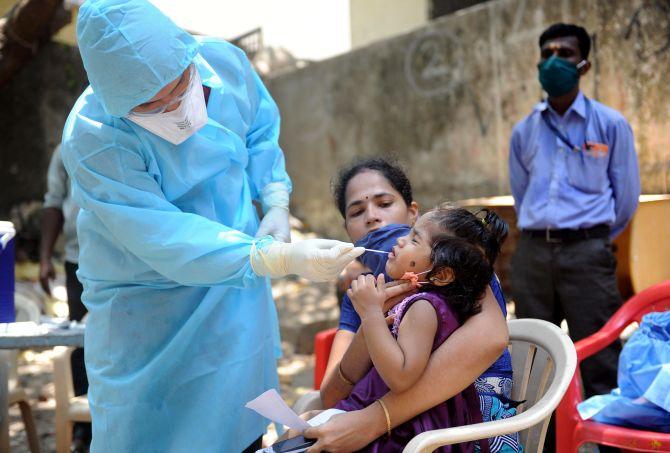'One good thing is it is not mutating or evolving faster.'
'It is good news as far as a vaccine is concerned because the target will not change by the time the vaccine is out.'

"It is extremely important for all of us to think that all are vulnerable, and that all of us should protect ourselves and the others from getting infected," Dr Rakesh K Mishra, director, Centre for Cellular and Molecular Biology, Hyderabad, tells Shobha Warrier/Rediff.com in the concluding segment of the two-part interview:
How does genome sequencing help fight the virus?
It will help us understand how it spreads, in which area it spreads more, etc. Then, we can have safety measures like more restrictions there. You can manage the virus with this knowledge.
One good thing is, it is not mutating or evolving faster.
It is good news as far as a vaccine is concerned because the target will not change by the time the vaccine is out.
The virus found in China is different from what is there in Europe or America, which means, it is different in different regions because of mutation. In that case, will one vaccine be effective in all the regions?
That's a very important point. The answer is not yet clear; it is yes and no. That's why more than 100 vaccine trials are going on in various countries.
One vaccine may not be effective for all the people belonging to different genetic backgrounds, different age groups, etc.
There are many such variables. That's why many trials are going on.
It is less likely that we may need different vaccines, but one cannot rule out such a possibility.
What makes the virus mutate in different regions? Has it anything to do with the conditions or people?
To survive changing environmental conditions, you need variations.
As the environment changes, some variants turn out to be more efficient, and the non-efficient ones disappear.
Mutation is a natural process. Every organism changes and if it doesn't, it will not persist for a long time.
Simpler organisms mutate faster as they can do many experiments because of their large number and faster generation rate.
Because our immune system keeps fighting, they mutate to fight our immune system.
That's why every season we get common cold even though we develop antibodies against cold.
The virus mutates and comes in different forms every year.
One of the fundamentals of biology is that unless mutations take place, new life will not come into being.
Like every individual is different, parasites also keep changing so that newer and newer versions come into existence.
For example, because the virus keeps mutating, one of the strains become resistant to antibiotics.
Then, this new strain will dominate till a new antibiotic is developed to fight it.
Why is it that the mortality rate in India is much lower than other countries? Is it because of the age of the population, or because Indians are exposed to many kinds of viruses and bacteria?
Both are important possibilities.
Perhaps we are able to manage because at some point, we might have had an infection and developed immunity which is there in the memory.
Maybe the virus that is here is less lethal because of mutations.
At present, we have the genome sequence of the virus, and also samples from patients.
So, we can now compare the genome sequence with what is present in the other countries.
Do you feel the first three COVID-19 cases that came from Wuhan to Kerala might have been different from the recent A2a and A3i coronavirus?
Now we know that the virus from Wuhan is B and what is circulating now is A.
The ones that came from Wuhan were contained efficiently, and did not spread in India.
Those came from South East Asia in mid-late March and later spread quite a bit in India.
The A2a came most probably from Europe, and that also spread widely in India.
Is the novel coronavirus created by man in a lab?
Very unlikely.
There is no strong scientific reason to think or believe that it is a man-made virus.
Now that India is slowly opening up, more and more cases are coming up. When do you think we will reach the peak?
 Though it is not my domain, I feel we are nowhere near the peak. We are just climbing.
Though it is not my domain, I feel we are nowhere near the peak. We are just climbing.
Yes, lockdown has been relaxed not because of medical reasons but because of economic reasons.
How long can people lock themselves up at home?
This is really a recipe for disaster, but I really hope it will not go that way.
Now that we are opening up, people will interact more and cases will go up faster.
It is for people to protect themselves by not going to crowded places, keep distance and wear a mask.
For a country like India with such a huge population, will it take a really long time to get herd immunity?
It will take a very long time.
If we accelerate that, the price that we have to pay will be huge.
To get herd immunity, 60% or more people should get infected.
60% of India's population is a very large number.
And even if a fraction of that population needs ventilator or ICU, that again is a big number.
When the number of cases increases beyond a point, panic will set in. Hospitals will get over crowded.
So, it is extremely important for all of us to think that all are vulnerable, and that all of us should protect ourselves and the others from getting infected.
Since we know how this virus spreads, we can prevent that -- by simple things like social distancing, hand hygiene and using face mask.
Only then we can move to the other side of the pandemic with less pain.











 © 2025
© 2025